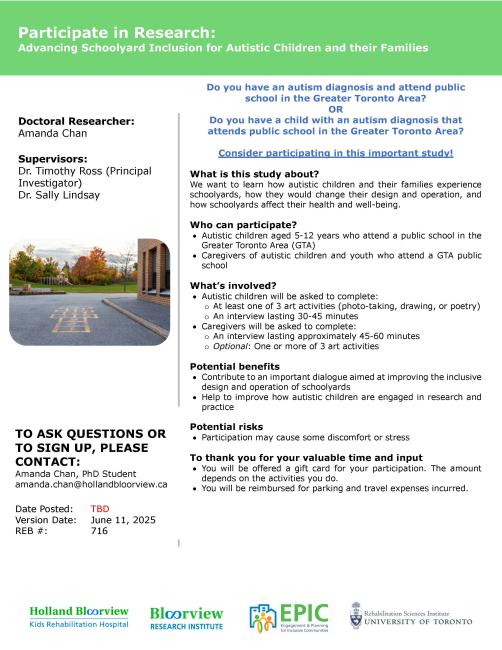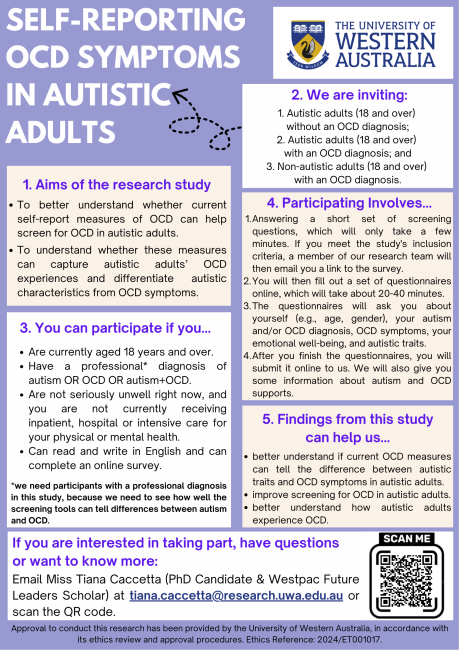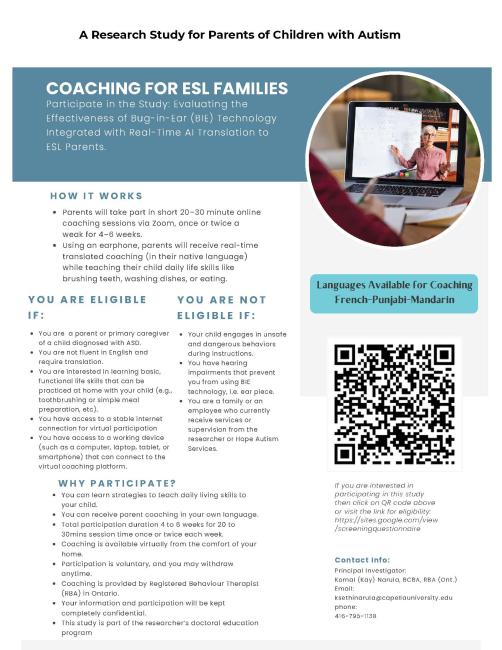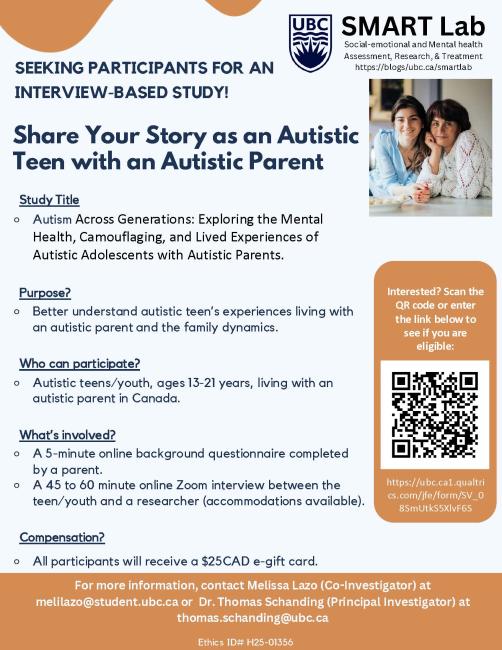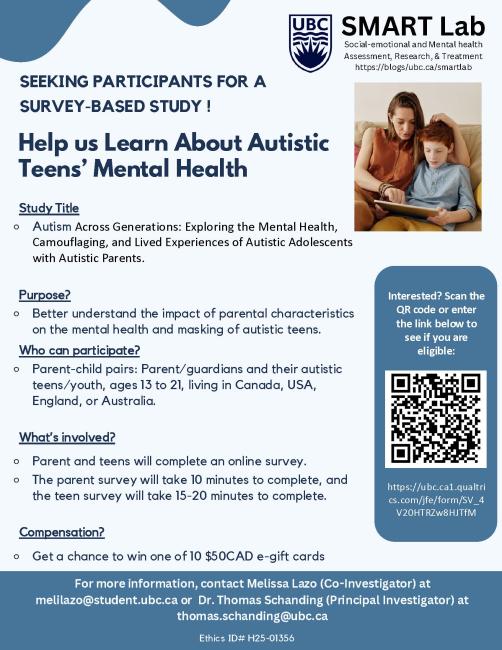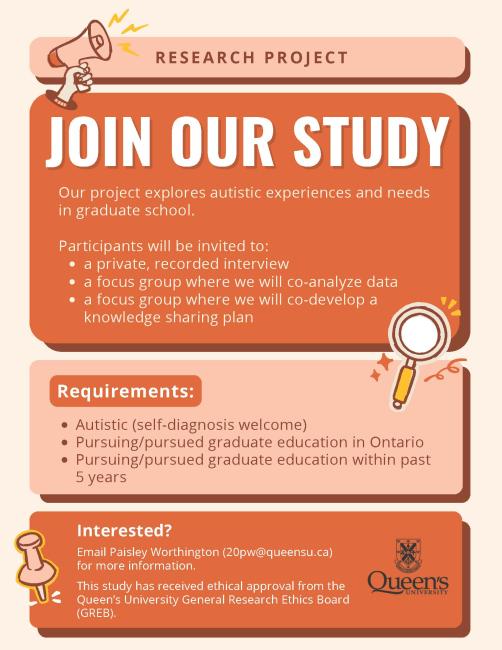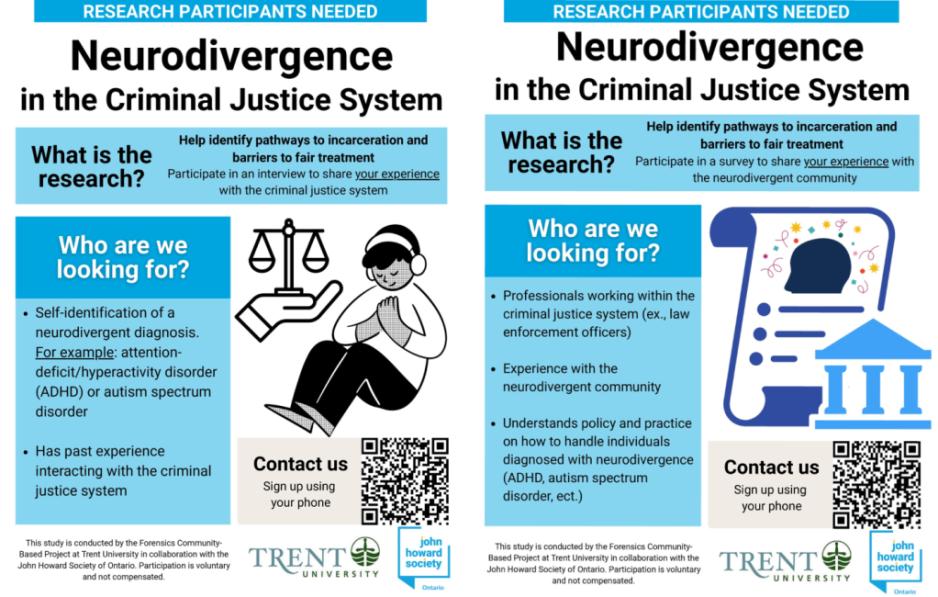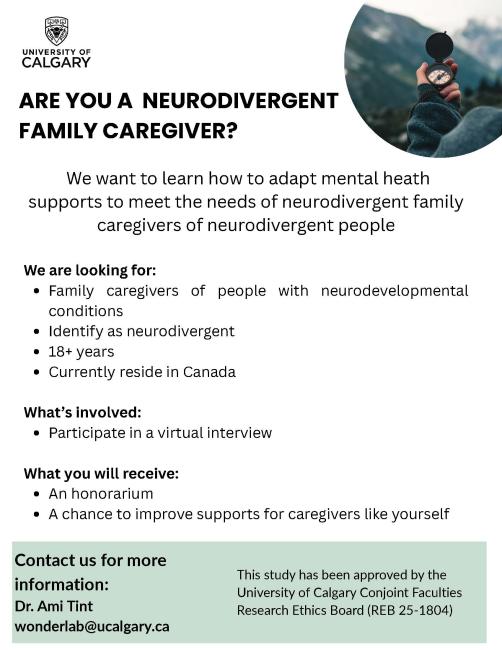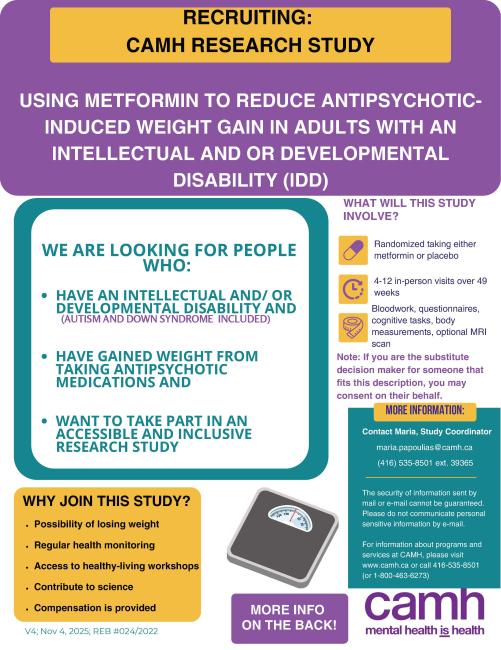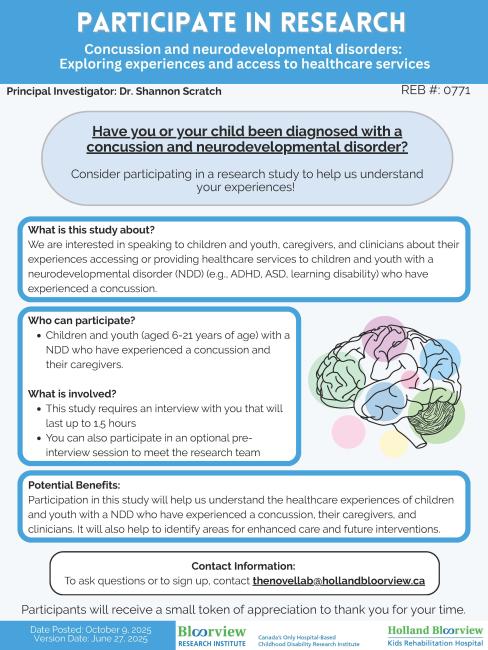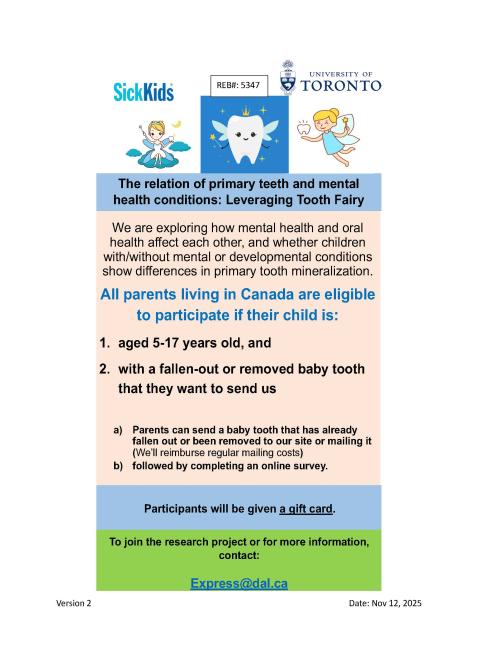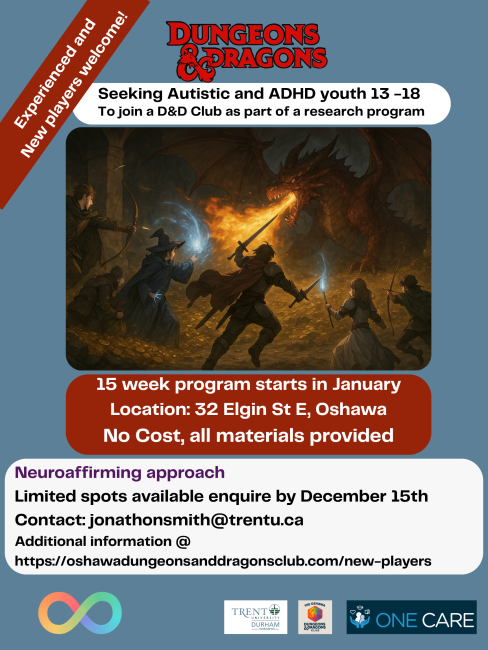Research Participation Opportunities
Cette page n’est pas disponible en français, cliquez ici pour voir la page en anglais
🏫We’re inviting autistic children (ages 5–12) and their caregivers in the Greater Toronto Area to take part in a study at the Bloorview Research Institute at Holland Bloorview: “Advancing Schoolyard Inclusion for Autistic Children and their Families.”
💬Our team (Co-Supervisors: Drs.Tim Ross & Sally Lindsay) wants to learn how autistic children and their families experience and engage with schoolyards — what makes these spaces welcoming, what challenges arise, and how they can be improved.
🎨 How you’ll participate:
Children: Choose one or more arts-based activities (photo-taking, drawing, or letter-writing) and join a short interview (30–45 min).
Caregivers: Take part in a 45–60 min interview and optional art activities.
📩 Interested? Contact: amanda.chan@hollandbloorview.ca
🔗Learn more: https://hollandbloorview.ca/advancing-schoolyard-inclusion-autistic-children-and-their-families-0
Names of Researchers:
• Miss Tiana Caccetta (PhD Candidate & Westpac Future Leaders Scholar)
• Associate Professor Iliana Magiati (Chief Investigator and PhD Supervisor)
• Dr Lauren Taylor (PhD Co-Supervisor)
• Professor Ailsa Russell (External PhD Co-Supervisor, University of Bath)
What is the study about?
This study wants to find out if the checklists we use to check for OCD can help identify OCD symptoms in autistic adults. We want to see if these checklists can tell the difference between autistic traits and OCD symptoms in autistic adults. We are also looking to find out if these checklists can show us what OCD is like in autistic adults.
Staff and students from The University of Western Australia (UWA) are running the study, together with a researcher from the University of Bath in the UK.
You can take part in this study if:
1. You are 18 years old or older, AND
2. A health professional diagnosed you with:
a. Autism, OR
b. Obsessive-Compulsive Disorder (OCD), OR
c. Both autism and OCD; AND
3. You are not seriously ill right now, and you are not currently receiving inpatient, hospital, or intensive care for your physical or mental health; AND
4. You speak English and can complete an online survey.
Participating Involves...
1. Answering a short set of screening questions, which will only take a few minutes. If you meet the study's inclusion criteria, a member of our research team will then email you a link to the survey.
2. You will then fill out a set of questionnaires online, which will take about 20-40 minutes.
3. The questionnaires will ask you about yourself (e.g., age, gender), your autism and/or OCD diagnosis, OCD symptoms, your emotional well-being, and autistic traits.
4. After you finish the questionnaires, you will submit it online to us. We will also give you some information about autism and OCD supports.
If you are interested in taking part, have questions or want to know more: email Tiana Caccetta (PhD Candidate & Westpac Future Leaders Scholar) at tiana.caccetta@research.uwa.edu.au
Pre-screening survey: https://uwa.qualtrics.com/jfe/form/SV_0OOLv9xT3QWqh7g
My name is Komal (Kay) Narula and I am a Ph.D. Candidate under the supervision of Dr. Cheryl Davis at Capella University completing program in Psychology with a specialization in Applied Behavior Analysis (ABA).
Study Purpose & Research Questions
The purpose of this study is to explore whether real-time translated coaching can help parents who speak English as a second language support their child with autism in learning everyday life skills at home. The study examines whether live coaching, delivered through a small earpiece and translated instantly using artificial intelligence (AI), improves parents’ confidence, understanding, and ability to teach daily skills such as self-care or household routines.
Participant Eligibility Criteria
Participants must be parents or primary caregivers of a child diagnosed with Autism Spectrum Disorder (ASD). Parents must prefer to receive coaching in a language other than English (Mandarin, French, or Punjabi). Families currently receiving services or supervision from the researcher or Hope Autism Services are not eligible.
Participation Details
Participation lasts approximately 4–6 weeks and takes place entirely online. Families will meet virtually to select a life skill, followed by short coaching sessions where parents practice teaching the skill with real-time translated support. Consent forms are available in the parent’s preferred language.
Compensation
There is no financial compensation for participation.
Ontario Regions
This study is open to families across Ontario, as all sessions are conducted virtually.
If you are interested in participating in this study, please scan the QR code below or visit the following link to check your eligibility:
https://sites.google.com/view/screeningquestionnaire
Contact Information
For more information, please contact:
Komal (Kay) Sethi
Email: ksethinarula@capellauniversity.edu
Phone: 416-795-1138
My name is Melissa Lazo and I am a Ph.D. Candidate under the supervision of Dr. Thomas Schanding at the University of British Columbia. We are recruiting participants for an interview study as part of my doctoral dissertation. This study will help us better understand the experiences of autistic adolescents and youth living with an autistic parent.
Who can participate?
We are looking for autistic adolescents and youth ages 13 to 21 and one of their autistic parents (self-diagnosis accepted) to participate in the study. Families must be living in Canada.
What's involved?
The study will involve a 45–60-minute online Zoom interview between the adolescent/youth and the researcher. Questions will focus on topics including autistic identity, daily life, and their interactions with their parents.
A 5-minute background questionnaire will be completed by the parent before the interview. Accommodations and flexible scheduling are available.
Will there be compensation?
Participating families will receive a $25CAD e-gift cards to thank them for their time.
Interested in participating or have questions?
Follow the link to the study screening questionnaire to see if you can participate:
https://ubc.ca1.qualtrics.com/jfe/form/SV_08SmUtkS5XlvF6S
Or contact Melissa Lazo (Co-Investigator; melilazo@student.ubc.ca) and/or Dr. Thomas Schanding (Principal Investigator; thomas.schanding@ubc.ca) for more information.
My name is Melissa Lazo and I am a Ph.D. Candidate under the supervision of Dr. Thomas Schanding at the University of British Columbia. We are recruiting participants for a survey study as part of my doctoral dissertation. This study will help us better understand the mental health and masking of autistic adolescents and youth with and without autistic parents.
Who can participate?
We are looking for autistic adolescent/youth ages 13 to 21 and one of their parents (autistic and non-autistic) to participate in the study. Families must currently be living in Canada, USA, England, or Australia.
What's involved?
The study will involve a 10-minute online survey completed by the parent and a 15-minute online survey completed by the adolescent/youth. A 5-minute Zoom video call will be required prior to the survey to verify participant identities and reconfirm consent.
Will there be compensation?
Families will have the opportunity to enter a draw for a chance to win one of 10 $50CAD e-gift cards to thank you for your time.
Interested in participating or have questions?
Follow the link to the study screening questionnaire to see if you can participate:
https://ubc.ca1.qualtrics.com/jfe/form/SV_4V20HTRZw8HJTfM
Or contact Melissa Lazo (Co-Investigator; melilazo@student.ubc.ca) and/or Dr. Thomas Schanding (Principal Investigator; thomas.schanding@ubc.ca)
My name is Paisley Worthington, and I am a doctoral researcher under the supervision of Dr. Patty Douglas at Queen’s University in the Faculty of Education. I am recruiting participants for my doctoral studies and would like to share the attached recruitment poster and linked video (click here to access the video).
The purpose of this research study is to better understand the experiences of autistic graduate students and how they may be better supported. Individuals would be asked to participate on three separate occasions for a total of approximately 4.5 hours over the course of a few months.
This study received ethical approval by Queen’s University General Research Ethics Board (GREB).
As indicated in both the flyer and video, folx are welcome to contact me (20pw@queensu.ca) if they are interested in participating.
Thank you for your time and consideration.
Hi!
My name is Alex; I am a 4th-year student at Trent University. In collaboration with the John Howard Society of Ontario and Trent University, we are conducting a research project that looks at neurodivergence within the criminal legal system.
We are looking for participants who have interacted with the criminal legal system and have a perceived neurodivergent diagnosis. Contributors will participate in a Zoom interview (lasting ~30 min), sharing their knowledge and experiences within the criminal legal system.
OR
Individuals who work in the criminal legal system, have experience working with the neurodivergent community, and understand their agency's policies/practice. Contributors will complete a survey (lasting around ~30 mins), sharing their knowledge about and experiences with the neurodivergent community.
If this sounds like something you (or someone else) would be interested in, please sign up using the link provided: https://forms.office.com/r/TXcRj5TpSL
If you have any further questions, please email me at alexhanlan@trentu.ca.
Thank you for your time!
Alex
What is this study about?
Researchers at the University of Calgary want to understand how to adapt mental health supports for neurodivergent family caregivers of people with neurodevelopmental conditions.
Who can participate?
You are eligible to participate if you:
• identify as neurodivergent
• care for a family member with a neurodevelopmental condition
• are 18 years old or older, and
• live in Canada.
What does participation involve?
You will participate in a virtual interview. A researcher will ask questions about your mental health support experiences and support needs. The interview will last approximately 45-60 minutes. All participants will be compensated for their time.
Contact wonderlab@ucalgary.ca to learn more about the study
We are looking for youth and adults ages 16-65 with intellectual and/or developmental disabilities (ASD included) who take antipsychotic medication and are either overweight or obese or have gained significant weight since starting their antipsychotic medication to participate in a research study at the Centre for Addiction and Mental Health (CAMH) in Toronto. The goal of this study is to see if a medication called metformin can help you lose weight and improve your physical health. As a participant, you will be given streamlined enrollment into the CAMH Metabolic Clinic and invited to monthly online group workshops that focus on healthy living put on by CAMH’s Azrieli Adult Neurodevelopmental Centre.
Please find linked the flyer and Frequently Asked Questions about the study.
Participation is voluntary and you will be compensated. If you are interested in participating or would like to learn more, please contact Maria, the study’s research coordinator at maria.papoulias@camh.ca or give her a call at 416-535-8501 ext 39365. CAMH REB #024/2022.
Summary: Youth with a neurodevelopmental disorder (NDD) are at risk of experiencing concussion, however, we have limited knowledge about their experiences or outcomes. There are no clinical guidelines for concussion management that considers the unique needs of these individuals.
Call to action: The NOvEL Lab at Holland Bloorview Kids Rehabilitation Hospital is looking for youth with a NDD who have had a concussion and caregivers to participate in this research project.
Who can participate:
- Youth who have a NDD (e.g. autism spectrum disorder, attention-deficit/hyperactivity disorder, learning disabilities) and have experienced a concussion
- Caregivers of youth who have a NDD (e.g. autism spectrum disorder, attention-deficit/hyperactivity disorder, learning disabilities) and have experienced a concussion
What’s Involved:
- Youth/caregiver participants: You will participate in an interview about your/your child’s experience having a neurodevelopmental disorder and a concussion. We will also ask you questions about your experience accessing concussion-related healthcare services. We will ask you to complete a short survey to understand more about you.
Participants will receive a gift card to thank them for their time.
Interested in Participating? If you are interested in participating in this study or have additional questions, please contact Kylie Mallory at thenovellab@hollandbloorview.ca with your interest, and they will get back to you shortly. Contacting us does not obligate you or your child to participate in the study.
We are clinicians and researchers in the fields of dentistry and mental health across Canada including IWK, Dalhousie, SickKids, CHEO. We are conducting a research project investigating the relationship of mental and dental health, which is approved by Ethics Board.
Parents are eligible to participate in this study if their child is:
- aged 5-17 years old, and
- with a fallen-out or removed baby tooth that they want to share.
Instead of the tooth going in the bin, you can choose to share the tooth for a study looking at the link between mental and dental health. Participation involves a) sharing the tooth by dropping it off to our site or mailing it (mailing costs will be reimbursed) and b) completing a 20-minute online survey. As a thank-you, you will receive a gift card.
If you are interested in joining, please email us at Express@dal.ca
Adventure and fun in a neuroaffirming environment. Trent University and One Care are partnering for research on the Oshawa Dungeons & Dragons Club a Social Program for neurodivergent youth. The D&D program will start in late January or Early February and last for 15 weeks and have weekly 2.5hr game sessions. There is no cost to the program and participants will be provided with all materials needed to play.
Participants and parents will be asked to complete questionnaires prior to starting the program and again when the program ends. The program will take place at 32 Elgin St E, Oshawa Ontario. To register or request more information contact Jonathon Smith at jonathonsmith@trentu.ca. Additional information can be found at oshawadungeonsanddragonsclub.com/new-players.
Western University, in collaboration with Autism Ontario, is conducting a study to better understand how families and professionals navigate autism services across the province.
Purpose of the Study:
This research aims to map pathways of autism support and identify factors that help or hinder access to services for autistic children and their families.
Who Can Participate:
- Caregivers of autistic children who live in Ontario and speak English
- Stakeholders (such as policy makers, healthcare providers, and educators) who provide autism-related services in Ontario
What Participation Involves:
Participants may choose to take part in either:
- A focus group (approximately 2 hours, $50 honorarium)
- An individual interview (approximately 1.5 hours, $50 honorarium)
Topics discussed will include your experiences with diagnosis, navigating systems of care, barriers to access, and available supports.
Participation is voluntary and choosing to participate or not will not affect any autism-related services you receive from Autism Ontario or elsewhere.
Interested in learning more?
Please contact nneil@uwo.ca or research@autismontario.com for more information or to express interest in participating.
Institution: King’s University College at Western University
Study Purpose & Research Questions:
This study aims to provide a comprehensive analysis of the economic impacts faced by families raising autistic children in Ontario. It seeks to:
1. Estimate the direct (e.g., health and education costs related to autism) and indirect costs (e.g., loss of income /productivity for parents or caregivers) borne by these families, and
2. Examine how these costs vary across households with different characteristics (e.g. children’s level of need, household income, and ethnic background).
Participant Eligibility:
We are seeking primary caregivers (mother, father, guardian, etc.) of at least one child aged 0-25 with autism diagnosis who are familiar with the family’s finances.
Participation Details & Compensation:
The survey includes two parts. Upon full and valid completion of Part 1, participants will have a chance to win one of forty $50 prizes (approx. 1/35 chance). Those who complete both Parts 1 and 2 will have a chance to win one of forty $100 prizes (approx. 1/25 chance) or one of two $500 grand prizes.
Contact:
For more information, please contact the principal investigator, Dr. Jingjing Xu, at jxu938@uwo.ca.

